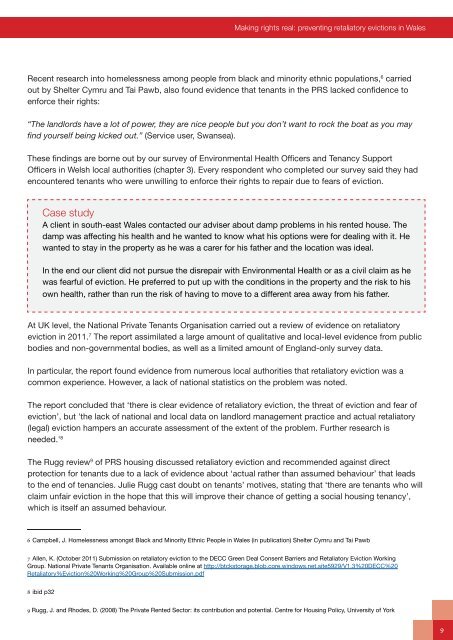Retaliatory eviction - Citizens Advice
Retaliatory eviction - Citizens Advice
Retaliatory eviction - Citizens Advice
You also want an ePaper? Increase the reach of your titles
YUMPU automatically turns print PDFs into web optimized ePapers that Google loves.
Making rights real: preventing retaliatory <strong>eviction</strong>s in WalesRecent research into homelessness among people from black and minority ethnic populations, 6 carriedout by Shelter Cymru and Tai Pawb, also found evidence that tenants in the PRS lacked confidence toenforce their rights:“The landlords have a lot of power, they are nice people but you don’t want to rock the boat as you mayfind yourself being kicked out.” (Service user, Swansea).These findings are borne out by our survey of Environmental Health Officers and Tenancy SupportOfficers in Welsh local authorities (chapter 3). Every respondent who completed our survey said they hadencountered tenants who were unwilling to enforce their rights to repair due to fears of <strong>eviction</strong>.Case studyA client in south-east Wales contacted our adviser about damp problems in his rented house. Thedamp was affecting his health and he wanted to know what his options were for dealing with it. Hewanted to stay in the property as he was a carer for his father and the location was ideal.In the end our client did not pursue the disrepair with Environmental Health or as a civil claim as hewas fearful of <strong>eviction</strong>. He preferred to put up with the conditions in the property and the risk to hisown health, rather than run the risk of having to move to a different area away from his father.At UK level, the National Private Tenants Organisation carried out a review of evidence on retaliatory<strong>eviction</strong> in 2011. 7 The report assimilated a large amount of qualitative and local-level evidence from publicbodies and non-governmental bodies, as well as a limited amount of England-only survey data.In particular, the report found evidence from numerous local authorities that retaliatory <strong>eviction</strong> was acommon experience. However, a lack of national statistics on the problem was noted.The report concluded that ‘there is clear evidence of retaliatory <strong>eviction</strong>, the threat of <strong>eviction</strong> and fear of<strong>eviction</strong>’, but 'the lack of national and local data on landlord management practice and actual retaliatory(legal) <strong>eviction</strong> hampers an accurate assessment of the extent of the problem. Further research isneeded.' 8The Rugg review 9 of PRS housing discussed retaliatory <strong>eviction</strong> and recommended against directprotection for tenants due to a lack of evidence about ‘actual rather than assumed behaviour’ that leadsto the end of tenancies. Julie Rugg cast doubt on tenants’ motives, stating that ‘there are tenants who willclaim unfair <strong>eviction</strong> in the hope that this will improve their chance of getting a social housing tenancy’,which is itself an assumed behaviour.6 Campbell, J. Homelessness amongst Black and Minority Ethnic People in Wales (in publication) Shelter Cymru and Tai Pawb7 Allen, K. (October 2011) Submission on retaliatory <strong>eviction</strong> to the DECC Green Deal Consent Barriers and <strong>Retaliatory</strong> Eviction WorkingGroup. National Private Tenants Organisation. Available online at http://btckstorage.blob.core.windows.net.site5929/V1.3%20DECC%20<strong>Retaliatory</strong>%Eviction%20Working%20Group%20Submission.pdf8 ibid p329 Rugg, J. and Rhodes, D. (2008) The Private Rented Sector: its contribution and potential. Centre for Housing Policy, University of York9




![Annual review [ 1.4 MB] - Citizens Advice](https://img.yumpu.com/50679529/1/190x135/annual-review-14-mb-citizens-advice.jpg?quality=85)

![Help for helping your residents [ 2.4 MB] - Citizens Advice](https://img.yumpu.com/48848542/1/185x260/help-for-helping-your-residents-24-mb-citizens-advice.jpg?quality=85)







